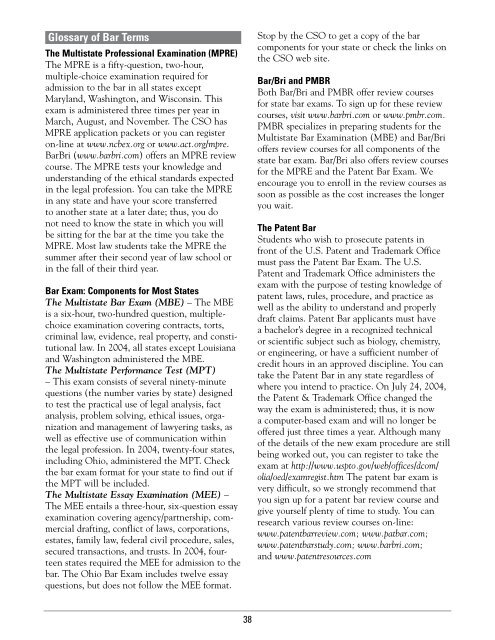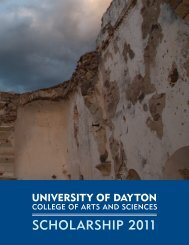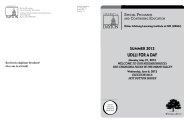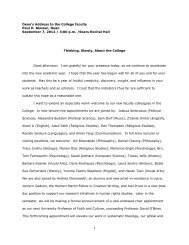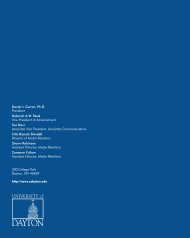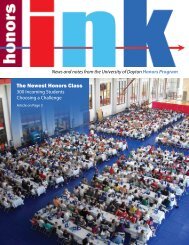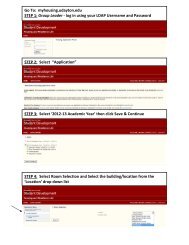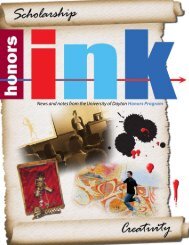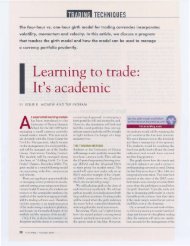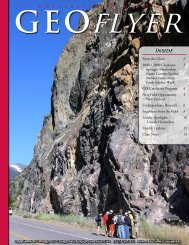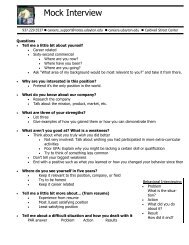UDSL Job Search Manual - University of Dayton
UDSL Job Search Manual - University of Dayton
UDSL Job Search Manual - University of Dayton
You also want an ePaper? Increase the reach of your titles
YUMPU automatically turns print PDFs into web optimized ePapers that Google loves.
Glossary <strong>of</strong> Bar Terms<br />
The Multistate Pr<strong>of</strong>essional Examination (MPRE)<br />
The MPRE is a fifty-question, two-hour,<br />
multiple-choice examination required for<br />
admission to the bar in all states except<br />
Maryland, Washington, and Wisconsin. This<br />
exam is administered three times per year in<br />
March, August, and November. The CSO has<br />
MPRE application packets or you can register<br />
on-line at www.ncbex.org or www.act.org/mpre.<br />
BarBri (www.barbri.com) <strong>of</strong>fers an MPRE review<br />
course. The MPRE tests your knowledge and<br />
understanding <strong>of</strong> the ethical standards expected<br />
in the legal pr<strong>of</strong>ession. You can take the MPRE<br />
in any state and have your score transferred<br />
to another state at a later date; thus, you do<br />
not need to know the state in which you will<br />
be sitting for the bar at the time you take the<br />
MPRE. Most law students take the MPRE the<br />
summer after their second year <strong>of</strong> law school or<br />
in the fall <strong>of</strong> their third year.<br />
Bar Exam: Components for Most States<br />
The Multistate Bar Exam (MBE) – The MBE<br />
is a six-hour, two-hundred question, multiplechoice<br />
examination covering contracts, torts,<br />
criminal law, evidence, real property, and constitutional<br />
law. In 2004, all states except Louisiana<br />
and Washington administered the MBE.<br />
The Multistate Performance Test (MPT)<br />
– This exam consists <strong>of</strong> several ninety-minute<br />
questions (the number varies by state) designed<br />
to test the practical use <strong>of</strong> legal analysis, fact<br />
analysis, problem solving, ethical issues, organization<br />
and management <strong>of</strong> lawyering tasks, as<br />
well as effective use <strong>of</strong> communication within<br />
the legal pr<strong>of</strong>ession. In 2004, twenty-four states,<br />
including Ohio, administered the MPT. Check<br />
the bar exam format for your state to find out if<br />
the MPT will be included.<br />
The Multistate Essay Examination (MEE) –<br />
The MEE entails a three-hour, six-question essay<br />
examination covering agency/partnership, commercial<br />
drafting, conflict <strong>of</strong> laws, corporations,<br />
estates, family law, federal civil procedure, sales,<br />
secured transactions, and trusts. In 2004, fourteen<br />
states required the MEE for admission to the<br />
bar. The Ohio Bar Exam includes twelve essay<br />
questions, but does not follow the MEE format.<br />
Stop by the CSO to get a copy <strong>of</strong> the bar<br />
components for your state or check the links on<br />
the CSO web site.<br />
Bar/Bri and PMBR<br />
Both Bar/Bri and PMBR <strong>of</strong>fer review courses<br />
for state bar exams. To sign up for these review<br />
courses, visit www.barbri.com or www.pmbr.com.<br />
PMBR specializes in preparing students for the<br />
Multistate Bar Examination (MBE) and Bar/Bri<br />
<strong>of</strong>fers review courses for all components <strong>of</strong> the<br />
state bar exam. Bar/Bri also <strong>of</strong>fers review courses<br />
for the MPRE and the Patent Bar Exam. We<br />
encourage you to enroll in the review courses as<br />
soon as possible as the cost increases the longer<br />
you wait.<br />
The Patent Bar<br />
Students who wish to prosecute patents in<br />
front <strong>of</strong> the U.S. Patent and Trademark Office<br />
must pass the Patent Bar Exam. The U.S.<br />
Patent and Trademark Office administers the<br />
exam with the purpose <strong>of</strong> testing knowledge <strong>of</strong><br />
patent laws, rules, procedure, and practice as<br />
well as the ability to understand and properly<br />
draft claims. Patent Bar applicants must have<br />
a bachelor’s degree in a recognized technical<br />
or scientific subject such as biology, chemistry,<br />
or engineering, or have a sufficient number <strong>of</strong><br />
credit hours in an approved discipline. You can<br />
take the Patent Bar in any state regardless <strong>of</strong><br />
where you intend to practice. On July 24, 2004,<br />
the Patent & Trademark Office changed the<br />
way the exam is administered; thus, it is now<br />
a computer-based exam and will no longer be<br />
<strong>of</strong>fered just three times a year. Although many<br />
<strong>of</strong> the details <strong>of</strong> the new exam procedure are still<br />
being worked out, you can register to take the<br />
exam at http://www.uspto.gov/web/<strong>of</strong>fices/dcom/<br />
olia/oed/examregist.htm The patent bar exam is<br />
very difficult, so we strongly recommend that<br />
you sign up for a patent bar review course and<br />
give yourself plenty <strong>of</strong> time to study. You can<br />
research various review courses on-line:<br />
www.patentbarreview.com; www.patbar.com;<br />
www.patentbarstudy.com; www.barbri.com;<br />
and www.patentresources.com<br />
38


